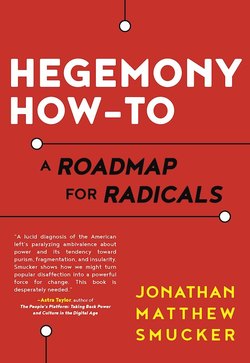Читать книгу Hegemony How-To - Jonathan Smucker - Страница 4
На сайте Литреса книга снята с продажи.
Acknowledgments
ОглавлениеThere is a joke among organizers, that we ourselves are often quite disorganized. As someone who is surely guilty of this charge, I am certain that I will now forget some of the many people who have helped me with this book in so many ways. Hegemony How-To is the product of social movements. In contrast to academia, social movements tend to be spaces where individuals freely contribute ideas without much bother about proprietary questions concerning origins or credit. And the truth is that no book belongs to its author alone. While I take sole responsibility for the errors and shortcomings in this work, I am happy to share credit far and wide for anything the reader may find useful. I have wrestled with this work amidst constant dialogue and ongoing collaboration with several groups and countless individuals, over the course of many political struggles. I would like to express my deepest gratitude for the people who have helped me with this process.
First and foremost, I want to thank my partner in crime, Becca Rast, whose support throughout this long process has been so important to me, from providing invaluable feedback on draft chapters to tolerating my frequent antisocial retreats and solo all-nighters. I also want to thank Becca’s and my families for all of their support along the way.
I would like to thank everyone in Beyond the Choir for workshopping sections of this book as part of our training curriculum: Ange Tran, Anika Fassia, Charon Hribar, Jose Vasquez, Judith Leblanc, Michelle Crentsil, Scott Roberts, and Perry O’Brien. I especially want to thank Perry for providing elaborate feedback on the entire first draft of the book. Thanks also to Madeline Gardner, who helped to start Beyond the Choir as a humble side project over a decade ago, and whose intellectual collaboration set me on the path of developing the core ideas in Hegemony How-To.
Other movement groups and organizations that have helped to shape or support this book include Beautiful Trouble (especially Andrew Boyd, who deserves praise or blame for convincing all parties involved to keep the title; Andrew also provided me with volumes of helpful feedback); the Center for Story-based Strategy, whose narrative strategy tools have had a tremendous influence on my thinking (special thanks to Patrick Reinsborough and Doyle Canning); and the clandestine affinity group The Recidivists of Occupy Wall Street infamy (you know who you are).
I also want to thank all of my colleagues in the sociology department at UC Berkeley. I feel especially grateful for the wonderful and fun-loving members of my cohort, who, knowingly or not, helped me through our seminar discussions to work out many of the ideas in this book: Aya Fabros, David Showalter, Fatinha Santos, Ghaleb Attrash, Liz McKenna, Mark Quinn, Martin Eiermann, Ogi Radic, Phung Su, Robert Pickett, Santiago Molina, Seth Leibson, Steven Lauterwasser, Tom Gilbert, and Véronique Irwin. Faculty members who have been especially helpful in providing advice and feedback include Cihan Tuğal, Kim Voss, Loïc Wacquant, Margaret Weir, Marion Fourcade, and Michael Burawoy. Other colleagues at UC Berkeley (in or close to the sociology department) who workshopped chapters with me or who otherwise deserve credit: Alex Barnard, Ana Villarreal, Fidan Elcioglu, Gabriel Hetland, Rebecca Tarlau, as well as visiting scholars Marie Mourad and Simon Escoffier. Prior to my arrival at Berkeley, two of my advisors at Goddard College, Robert Buchanan and Eva Swidler, provided extensive feedback on early versions of chapters (in the form of assignments).
Other individuals who have provided me with thoughtful feedback on sections of the book, or who have provided helpful advice or much-appreciated support: Allyson Gross, Andrew Hsaio, Astra Taylor, Austin Thompson, Beka Economopoulos, Brooke Lehman, Chandra Russo, Erik Olin Wright, Ernesto Laclau, Francesca Polletta, George Lakey, Guido Girgenti, Han Shan, Hannah Dunphy, Harmony Goldberg, Harriet Barlow, Holly Scott, James Jasper, Jane McAlevey, Janice Fine, Jason Haas-Hecker, Kate Aronoff, Leah Hunt-Hendrix, Lina Blount, Mark Engler, Marshall Ganz, Max Berger, Max Elbaum, Meghna Chandra, Nelini Stamp, Nick Martin, Paul Engler, Richard Flacks, Richard Healey, Sara Blazevic, Waleed Shahid, Will Lawrence, William Gamson, and Zeynep Tufekci.
For two amazing month-long writing retreats, I am indebted to the Blue Mountain Center, whose coffee, cookies, and delicious cuisine made for the best writing fuel. And for a privately hosted month-long writing retreat in Arcata, California, I have to thank the Nasti Family: Hannah, James, Nyah, and Zae.
Finally, in writing this book, I stand on the shoulders of all those who have gone before, who number too many to even begin to list. But if I were to single out one specific person whose life and ideas contributed to this specific work, I would thank Antonio Gramsci—for his dedicated contribution to the social world from which he was banished. I wonder what he felt as he scribbled in fits and starts what we have come to know as the Prison Notebooks. I imagine that he must have tapped into some reserve whose source had to be somewhere far beyond the prison walls, whose truth was beyond the grasp of the fascist’s censor. What is it that kept him at it, that kept him agonizing over how best to engage with this beautiful world, even as he had been sealed off from its wonders and beauty; over how best to engage power, even as power had confined him to a cell? What inspiration might we take today in our own struggles—personal and political—from such a persistent spirit who enjoins us to hold onto both a “pessimism of the intellect” and an “optimism of the will”?1
1 Antonio Gramsci, Selections from the Prison Notebooks, ed. and trans. Quentin Hoare and Geoffrey Nowell Smith (New York: International Publishers, 1971), 175.
